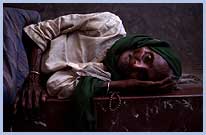

Refugees are people who flee their country because of 'a well-founded fear of persecution for reasons of race, religion, nationality, political opinion or membership of a particular social group'.
Asylum seekers are people who have left their own countries claiming persecution and are seeking a place of safety. They may be granted refugee status in their host country and be able to stay. Internally Displaced Persons (IDP's) like refugees, have been forced to leave their homes because of persecution, war or other threats, but unlike refugees, remain in their own country. Increasingly, they are the victims of civil war.
Returnees are refugees who, when conditions allow, return to their own countries. They may return by themselves or with the assistance of the UNHCR or other agencies. This is called voluntary repatriation. |
|
Refugee Hotspots
|
 Refugees either cannot return home, or are afraid to do so. Under the rules of the UN Convention a refugee has the right to stay in the new country for as long as may be needed.
Refugees either cannot return home, or are afraid to do so. Under the rules of the UN Convention a refugee has the right to stay in the new country for as long as may be needed.
 Migrants are people who move from their home to another place. This may be internal migration - movement within a country - or international migration where migrants leave their country to live in another country, often seeking more money and a better life for their children. Unlike refugees, migrants are free to return home if they should wish to because, although they may be very poor, their lives are not in danger. These types of migrants are often called economic migrants.
Migrants are people who move from their home to another place. This may be internal migration - movement within a country - or international migration where migrants leave their country to live in another country, often seeking more money and a better life for their children. Unlike refugees, migrants are free to return home if they should wish to because, although they may be very poor, their lives are not in danger. These types of migrants are often called economic migrants.